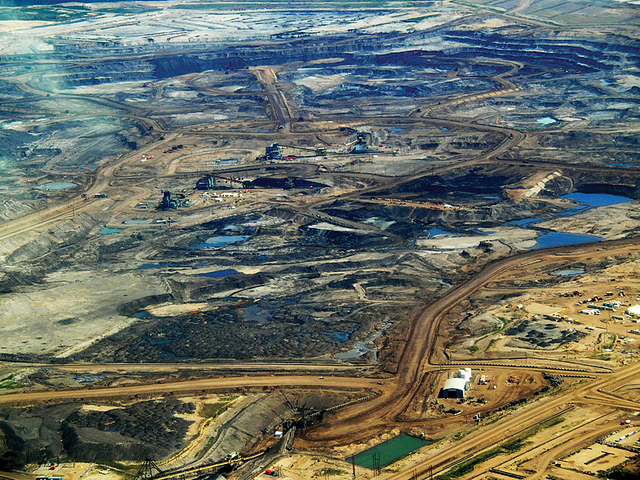This is a bit of a Straw Man thought experiment. It suggests that economic collapse might only occur when we can no longer keep generating more and more cheap energy, rather than when we realize that the current global mountain of debts can never be repaid, or that profits cannot possibly increase forever. It is probably a deeply flawed argument, and I’d love to hear what economists think about it.

Alberta Tar Sands, soon to cover an area larger than NY State; its toxic sludge ponds alone are large enough to be visible from space. Photo by Dru Oja Jay, Howl Arts Collective, for The Dominion CC-BY-2.0

So here’s the thing. Your argument about economic collapse being inevitable and overdue shows that you just don’t understand just how fictional the economy really is. It’s really just an agreement, mostly among those with wealth and power, on how that wealth and power is to be distributed. Like any fictional movie, it never has to end. We just keep adding sequels, upping the ante.
You say there are limits on how much debt can be accumulated before the economy collapses. That’s only true if the psychology of the market is such that those with money believe that the debts cannot be repaid, and therefore no one is willing to advance any more money, credit dries up, buying dries up, business dries up, profits plunge, and so on.
But the point is, the debts don’t ever have to be repaid. For those of us who have wealth — the 10% of us who have 80% of the net physical assets and 90% of the net financial assets — we’re content to just let those debts ride forever. Just keep rolling them over. We don’t even care if they’re worthless, as long as we, the 10%, agree not to call them in. After all, the Fed lets us borrow as much money as we want at 0% interest, so it’s not like we need the cash. We’re actually getting a pretty good ROI on what we’ve loaned out — an average of 16% when you weigh in the unsecured lines of credit, the 30% credit card interest, the car loans, the second and third home mortgages. So even if half of that interest is defaulted on, we’re still getting 8% on the money we lend out, which we borrowed from the Fed (essentially, the taxpayers) at 0%. What a great time to be rich!
And it’s the same with stocks. We own 90% of them, so we basically dictate the market price of them. We’ll never panic, even if the P/E ratios soar to 100 or more, which they’re at for Apple and Tesla and most of the other ‘prime investments’ we’re into. Because as long as we agree that the shares are worth that, they’re worth that. The peons can panic and sell, and their 10% won’t even cause a blip in the market. What else are we going to invest in with all our money, more Jaguars?
If the P/E seems to be a bit too high for comfort, we’ll just borrow some more money at 0%, and use it to buy back a bunch of the shares, until the P/E is back in an acceptable range again. No problem. A simple accounting trick and the prices are primed to climb again. And you won’t hear a peep from the peons about this. After all, while their 10% of the market is just a pittance, for most of them it’s their entire life savings, their retirement, their pension, their kids’ university fund. They’ll cheer when the price goes up, even if it makes no sense.
Yeah, I know, you’re worried about them drowning in debt. They’ve been drowning in debt for 30 years now, getting ever deeper into it. The median net worth of a family in this country is less than zero. They’re used to it. We’ve changed the laws so they essentially can’t declare bankruptcy anymore, so they’re just on the hook, for a lifetime. For their descendants’ lifetimes. Two incomes instead of one, now, per family, and longer and longer hours for (real-inflation-adjusted) less and less money per hour, every year. Deeper and deeper. We won’t let them go under; we just want to keep their shoulders to the grindstone, and not think about anything except the next thing they want to buy to feel a bit better about themselves and their situation. They may have a negative net worth, but they’ve all got two cars now, and a bigger house, so they think they’re better off than when they had equity, and savings, and only one of them had to work.
And why in the world would they ever aspire to have savings? To invest it to earn 0%, or worry about investing it in real estate or stocks whose value they have no control over? Nah, they’re happy. Well, they’re not happy that they have to work so hard, and they’re not happy about having no security, and they’re not happy about social and political and ecological collapse, but we just have to keep pitting them against each other over how to deal with those things, and then we can pretty much ignore them.
It was a bit of a challenge through the ’80s and ’90s to adjust the economy to keep the profits growing, I admit. We had to basically outsource and offshore all the labour costs and all the manufacturing, so we could cut out all those annoying costs and stop worrying about unions and environmental regulations. Now the only asset we have to worry about managing is the Brand, so the only costs we have to monitor are marketing costs —keeping all those peons salivating for the newer, faster, sexier everything. As long as they keep spending like good little consumers, we’re laughing. And everything we sell now — speed, sex, salt, sugar, both types of oil, drugs, escape, lifestyle, self-esteem, entertainment, thrills, self-gratification, 15 minutes of fame, creature comforts, more, more — is totally addictive, so we hardly even have to market. They sell each other on the next thing they need to buy, on social media, with just a little prompting from us.
Yeah, I know, because we got rid of all the decent-paying jobs (except ours, of course), it’s taken some work, and a lot of strong-arming of the politicians and preachers on the whole it’s-your-fault-you’re-poor/unemployed/sick thing, the whole responsibility-to-look-after-your-family thing, so that the peons sighed and agreed to do the really boring minimum wage service jobs just to eke by — often two or three jobs, part-time, with no costly ‘benefits’ for us to have to pay. But look at all the paper-shuffling jobs we’ve created that pay modestly more than minimum wage, that the peons can aspire to. Hundreds of thousands of jobs working for the HMOs alone. Millions more working for the banks, the insurance companies, the courier companies, and of course our latest bit of genius, “security” jobs. Instead of job security they have security jobs. Funny, huh?
You think they’re going to get fed up and revolt? On what basis? They’ve never known anything else. And it’s not like the education system’s going to wise them up. They’re not starving; in fact, thanks to the malnutrition caused by our Big Ag businesses, they’re overweight and feeling like they have no right to complain, and they’re too sick with diabetes and heart disease and cancer and depression and all the other stress-triggered diseases our various enterprises have given them to think straight anyway.
Yeah, I admit, there’s a bit of a problem there. They’re so sick they’re clogging up the hospitals and dying on us before they’ve finished their consumer lifecycle, and then they try to declare bankruptcy when they can’t pay the medical bills. Kind of a fly in the ointment there. But you know, we have a few tricks up our sleeve yet. After decades of telling them there’s no such thing as a free lunch, we’re going to give them one. We’re going to give them free medical care. We’ll have to have a flat tax to pay for it, of course. But are they going to be grateful! Even though we’re giving them what most of the affluent nations already have, they’re going to think we’re the most generous people on the planet.
And if they can’t pay the flat tax, we’ll allow them to take out reverse mortgages on their homes, or reverse loans on their cars. No, not so we can repo their assets when they die, are you crazy? The kids just take over the debts. We don’t care if they’re ever repaid. We have assets backing them, so we just borrow the money from the Fed — from the peons, really, if you look into it — fully collateralized, and we have all the cash we need.
You’re worried about the virus, aren’t you? You still don’t get it. We can fund that as well. It’s not as if they were doing anything of value before they lost their jobs anyway. The only reason we didn’t automate, or just “make redundant” most of their jobs, is because we need to keep the engine going. We need consumers, consumers with cash to buy more and more stuff to keep revenues and profits growing. Grow or die, my friend. The consumers are the hands that feed us, so we don’t want them starving or permanently unemployed. So we have kept all these Bullshit Jobs so they don’t feel ashamed to take money for doing nothing; we have to leave them their pride. And every penny we pay out for these jobs comes right back to us as soon as they get it. Gotta get that addictive spending cranked up again.
It astonishes me that the rabble among the peons have been calling for a guaranteed annual income as if this were a revolutionary and unthinkable thing. We’ve already introduced it for most of them with all the Bullshit Jobs, all that seemingly important work by the flunkies, goons, duct tapers, box tickers, and taskmasters that’s actually completely expendable, but which we’ve maintained so the peons can keep their sense of self-worth. We’re perfectly willing to introduce it for everyone else; after all, the money we pay them is going to come right back to us anyway. We just need to introduce it in a way that it won’t seem ‘unfair’ to the Bullshit Job workers, and so it’s not taken as some kind of shameful ‘welfare’, though that’s what it is.
The recent riots have given us some ideas. What if we reinvent the police forces as the Social Mediation forces, for example? We’d have to find something to do with all the extra armaments of course, but we could let the peons create unarmed Citizen Councils where each community would take over collective, consensual responsibility for the social wellness of the community. Maybe they’d even find some way of managing addiction, family violence, gangs and some of the other problems of the chronically poor, homeless, physically and mentally ill, unemployed and underemployed. You know, the people the police have to deal with now. They’d have the complete police budget to work with. And we could throw in some more money if they could actually succeed at reducing the costs of homelessness, illness and despair. Hardly rocket science. Everyone not otherwise employed would get a guaranteed minimum wage job with the Citizen Council. They could sort out who does what.
So they’d have this sense of more local power, whether it was actually real or not. They’d have the pride of doing seemingly useful work to earn a living. They’d get to know each other better. They might even solve a bunch of problems and pay for themselves, and maybe even reduce our philanthropy costs.
And the wonderful thing is — for us in the 10%, this wouldn’t change anything at all. We’d keep raking it in same as always. Every penny earned comes right back to us. The peons stay in economic thrall, working like hell to buy more and more of what we sell them, and ignoring all those big nasty issues like ecological collapse and the end of cheap energy.
‘Cause I know you were going to get around to that, my friend. Yes, those are the two issues that we actually don’t have a solution for. We’ve been stalling them off for more than fifty years now, but ultimately you can’t deny that, unlike our economy, which is just a fiction, the physical world does have limits to growth. The virus has probably put off the energy crisis another few years, but there are only so many frackin’ rabbits we can pull out of that hat. Growth is dependent on ever-increasing extraction of cheap energy; every barrel of oil does 4.5 person-years of work, producing stuff that generates revenues that generates profits that keep the growth cycle going. And make no mistake — what we call the ‘economy’ absolutely depends on continuing growth, which in turn depends on continuing increases in production and consumption of oil. If we can’t afford to extract it, we’re fucked. Eight billion humans we can handle, my friend. The end of cheap-to-extract energy we cannot.
And yes, we’re well on our way to ecological collapse. We can’t handle that either. But the interesting thing about humans is that we will believe what we want to believe, no matter what. And just like us, the peons don’t want to believe that the Human Experiment on this planet is inexorably coming to a ghastly and miserable end. At least not before they finally get theirs!
So the world is on fire, but no one wants to recognize it. So we can keep dancing. Until it doesn’t matter, to any of us, anymore. You want to get off, go ahead. I got mine, and I’m riding it to the end of the line. Too much to lose to stop now. No matter what the stakes, I’m all in.






Another home run Dave! I tell all my friends that if they aren’t reading Pollard’s weblog they’re missing out on one of the most thoughtful, profound, and intellectually provocative corners of the Web. How to Save the World broadcasts the real news and commentary downloaded with rigorous self-awareness via an informed heart and brain. Thank you!
The consensus view–across ideologies–is that debt can expand faster than income forever, although it’s unstated.
An interesting and thought-provoking analysis of the way the machine works, I realise that much of it is tongue-in-cheek but it’s a plausible description and pretty close to the truth, As a pensioner with a fixed income provided by the state, I am somewhat insulated from this but my kids aren’t.
Solid stuff Dave. Economic collapse is catastrophic for the faithful all around so is an impossible verbalization for many. But is also another apocalyptic myth in our culture. As you say belief is stubborn, but it seems to reach tipping points collectively and change. The timing and distribution of alternative currencies would really be harbingers (among others) of impending economic collapse- or would they come after- depends on the belief and faith in the money I guess.